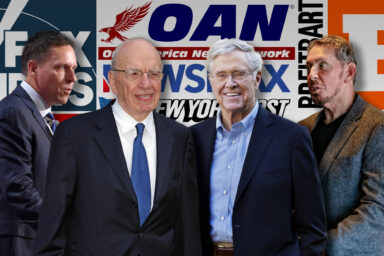The real role played by Donald Trump and those who occupy that special “entertainment” space in our political process is far more important—and sinister—than we seem to recognize. By their very participation in the campaign, they keep us from seeing that even the “legitimate” candidates are deeply problematical.
With Donald Trump now out of the presidential race, can we take a moment to consider the context in which he existed?
First, here’s Washington Post columnist Dana Milbank with the conventional bit:
Having Donald Trump in the presidential race gave it the feel of a carnival.
ABC News described his “roller-coaster flirtation” with a run for the White House. The Post’s Chris Cillizza wrote of the “circus-like speculation” about his presidential aspirations. The New York Daily News put Trump in clown makeup and called him “Sideshow Don,” while the Post’s Jennifer Rubin dubbed him “Trump the Clown.” President Obama himself used the term “carnival barker” in an apparent reference to Trump.
But I think a different theme-park metaphor might be more relevant to the last 90 days of the Trump pseudo campaign: the House of Horrors. He showed us how truly scary our political system has become….
Here’s where I beg to differ. Donald Trump is only one of many reminders of what is a bigger problem. It is not that nutsos and self-promoting empty shells running for president are signs of “how truly scary our political system has become.”
What is scary is how elections themselves have very little to do with anything—yet they suck up a tremendous amount of energy from the media and the public, leaving little left for the hard work of actually figuring out how to make a go of this country and this world.
They principally provide material for distraction. There’s a reason that many of the people who spend a lot of their time thinking and talking about celebrities’ private lives, and/or memorizing the statistics of scores of sports stars, also derive deep satisfaction from the seasonal political game. It…is….an….amusement.
For even Dana Milbank gets an entire column out of how much he finds Trump emblematic of “our political system, which rewards hucksters.” That’s the kind of theme that makes columns go round.
No, the bigger problem is that we fail to properly study the system itself in terms of the “non-hucksters” who get to the top.
How is it, do you suppose, that an exciting reformer like Obama would turn out in so many ways to be rather like the other men who came before him?
How do you suppose it is that the ones who really seemed even a tad fiery, who talk a lot about big money, about accountability for the Pentagon and the CIA, who talk openly about ordinary people getting screwed, that sort of thing—the Howard Deans, the Gary Harts, the John Edwards’, the John Andersons—for one reason or another never manage to get in? Usually, they don’t make it through the primaries. And it’s not just because some of them have an eye for the ladies, or whatever their personal defect supposedly is.
The truth is there’s something wrong with our shining democracy itself.
The range of permissible options seems permanently constricted.
Do you want some war overseas, or a lot? Do you prefer that workers give away all of the gains they’ve made in the past century, or just many of those gains? Do you want to do nothing about climate change or make some noise but still do very little? Do you favor one group of investment bankers determining economic policy—or another? Which Ivy League crew is your favorite? What’s your flavor—Dick Cheney or Rahm Emanuel?
The Donald Trumps, the Sarah Palins, and their ilk are not a sideshow to the real, substantive campaign. They are a distraction so that, by comparison, the rest can seem to offer us something.
When in fact, they do not.
(More to come on this subject)
GRAPHIC: https://www.smugnews.com/wp-content/uploads/2010/07/donald-trump-obama.jpg



